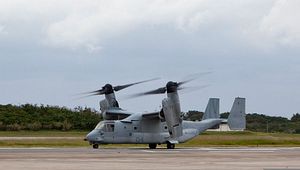On January 24, a critical election took place in Okinawa. In the city of Ginowan, where U.S. Marine Corps Air Station (MCAS) Futenma is located, two candidates fought for the mayorship. In the end, the incumbent Atsushi Sakima who called for the earliest closure of MCAS Futenma and the return of the land occupied by the base, fended off the challenge from Keiichiro Shimura.
This election attracted a great deal of attention because it has been regarded as a “proxy war” between the Abe administration and Okinawan Governor Takeshi Onaga. The incumbent Sakima received support from the ruling Liberal Democratic Party-Komeito coalition. The opponent Shimura had the full support of Governor Onaga, who rallied around Shimura throughout the campaign.
The election result brings both positive and negative news to the Abe administration. On the positive side, this was the first local election in Okinawa in which the candidate backed by the LDP won, particularly after the election of Onaga as a governor. Voters responded positively to Sakima’s central message throughout the campaign — close Futenma as soon as possible, so that its land can be returned to the local community and the risk of keeping Futenma in Ginowan can be reduced. With the voting rate inching close to 70 percent, Sakima’s successful reelection reflects the sentiment in Ginowan City, which strongly desire the relocation of MCAS Futenma out of its current location.
The bad news for Abe is that Sakima’s reelection does not directly translate into the support for the current Futenma relocation plan, which would see the air station moved to an offshore facility in Henoko. According to the exit poll taken by the Kyodo News, 56 percent of the Ginowans who voted in last week’s election do not support the government’s current relocation plan. Furthermore, the election results did not help soften Onaga’s position in any way. If anything, he could take the results of the election (Ginowan residents want to see MCAS Futenma to close as soon as possible) and exit poll (the majority opposes the relocation to Henoko) to harden his opposition against the government’s plan.
The central government in Tokyo and the Okinawa prefectural government have already become mired in a court battle over Onaga’s attempt to cancel his predecessor’s approval to begin the land reclamation necessary for the construction of the Futenma replacement facility in Henoko. Moreover, with both the Okinawan governor (Onaga) and the Nago City mayor (Susumu Inamine) remaining firmly opposed to Futenma’s relocation to Henoko, there is little prospect that the central government can engage in a serious dialogue with either the Okinawa prefectural government or Nago City on how to proceed with the relocation anytime soon. Simply put, although the result of Ginowan City election on January 24 seemed to favor Tokyo’s position, the fundamental challenges facing the current government-backed Futenma relocation plan remain unchanged.
The relocation of a U.S. military base as major as MCAS Futenma is no easy task. It is likely that there will be no cure-all answer that everyone will be satisfied with. Still, that should not be a reason why — despite 20 years and three rounds of U.S.-Japan consultation — MCAS Futenma remains in operation in a neighborhood that is increasingly at risk. This is certainly not what the Ginowan City residents expected when Washington and Tokyo first reached an agreement in April 1996. It is about time that the central government in Tokyo and the prefectural government engaged in serious dialogue on how to move this issue forward. If finding a solution that is satisfactory for all the stakeholders is not possible, it is the job of any responsible government to find a solution that is at least acceptable for all. Merely repeating the respective positions and criticizing the other side will not get the job done.
































